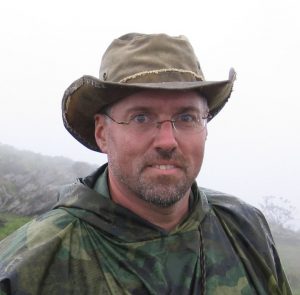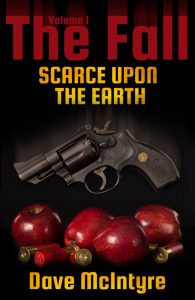BOD Spotlight with David McIntyre
Interview by Angie Taylor
 Welcome, David McIntyre to BOD’s author spotlight interview! Thank you so much for spending some time with us and helping all of us at Band of Dystopian Authors and Fans get to know you.
Welcome, David McIntyre to BOD’s author spotlight interview! Thank you so much for spending some time with us and helping all of us at Band of Dystopian Authors and Fans get to know you.
Thank you for the invitation. This is the first time I have given an interview as a writer. I’ve done many different things over the course of my career, teacher, pastor, missionary, and wilderness survival instructor, but writing fiction is relatively new for me and you are the first person to formally ask about it.
For starters, can you tell us how you heard about BOD and what attracted you to the group?
A year ago I knew NOTHING about indie publishing until a friend told me about how he launched his PA fiction under the name JT Sawyer and was having a great experience with it.
I have never done much with Facebook other than keep track of friends. When I decided to publish The Fall series on Kindle, I searched Facebook for anything related to the PA genre and found BOD. I was immediately struck by the activity level and participation on the page. People seemed to know and like each other. It was like finding intelligent life, community. True confession here…I have not been an avid reader of PA fiction for several years and felt very out of touch with people who were. I was searching for a place where I could get to know readers and so many pages barely have a pulse. Showing up at BOD was like going to a party where I didn’t know anyone and ending up playing beer-pong in the first ten minutes.
Tell us a little bit about your writing history. When did you know you loved to write and how did it all happen?
I have always had an overactive imagination. As a kid I was a role-playing game addict but always as the game-master not just a player. I was never satisfied with any of the pre-packaged games and ended up developing my own post-nuke game scenario that we played for several years. During those years I read every PA series I could, The Guardians and Deadlands are two I remember quite well.
I didn’t start writing fiction until college. As an elective, I took a course in creative writing and discovered that I had developed all sorts of muscles for character development, scene, and plot from years of running RPG’s and reading PA fiction like my life depended on it. The creative process was in place but that was the first time I had ever written anything down. The response in class and from guys in the dorm was very positive.
During my senior year, I started writing my first novel, Lyon’s Pride. I discovered how difficult it is to get it right. At this point, I was newly married and moved to Brazil to teach in an international school. Life turned into a wild ride and I set writing aside. That was 1992.
I started writing again three years ago with The Fall series. Like the pre-packaged role-playing games, I’m never satisfied with fiction. I’m not critical because I know how difficult it is, but I find myself suspending judgment often. It’s fiction, that’s part of it and it does not stop me from enjoying other people’s work. For some reason, zombie stories generate the most conflict for me. I found myself mulling over how it would have to be, resolving the issues I had with various scenarios. It came to the point of “put-up or shut-up” and I decided to work those solutions into a story.
Is there an author or genre that has influenced your writing?
For most of my adult life, I have been involved in public speaking and an early mentor told me to find my own voice. He told me it is essential to learn from others, but any attempt to copy them will obliterate that which is unique to me as a speaker. I believe that is true for writers. My writing heroes are Ernest Hemingway and John Steinbeck and I think I have read everything that Louis L’Amour ever wrote. Their male lead characters are unapologetically masculine without turning into caricatures. Especially with L’Amour, his characters follow a type but don’t degenerate into stereotypes. I can only hope they have influenced my writing.
Do you have some kind of writing routine that helps you create your stories? Are you an outliner or a pantser? What works for you?
I write the same way I navigate wilderness. I know where I want to wind up and I break the trip down into visible objectives or waypoints. I have to arrive at those waypoints to stay on course, but it doesn’t matter how I get to the next one. An outline is the ultimate buzz-kill. Along the way, my characters come up with things I never would have thought of. I have a solid concept of the setting and the characters, their motivations and limitations. I create problems for them and turn them loose to figure it out. I never say no to them for the sake of creating artificial tension. If they have access to a simple solution, they are free to take it. That just makes me find the real tension and force them to deal with it.
Now tell us about the first book in The Fall series. I have read a lot of books that deal with zombies of some kind. But your book approaches the idea from an angle that I found really believable. Without giving away too much can you tell us how you came up with the idea?
 Nothing makes me happier than to hear my premise is believable.
Nothing makes me happier than to hear my premise is believable.
I used to tell my wilderness survival students, “You are the Boogieman out here. Nothing in this jungle has a 16 inch steel tooth like you.” (machete) The idea of humanity turning against itself is a rational fear we all know by instinct. We don’t need superhuman, mutated powers to be the apex predator on this planet and we achieved that back in the stone-age. Human beings at their
worst are horrific. We are capable of incredible brutality and aggression once our restraint system fails. I find an enraged woman with a crowbar far more terrifying than a rotting corpse with bad teeth. Why don’t zombies fall apart? How would such a thing propagate?
I settled on a viral pandemic with one easy symptom that would ensure it spread through everyone’s normal routine. It had to kill most, but not all, and there had to be a way to survive with your mind intact. I have the disease pathology mapped out, but the survivors wouldn’t know how or why it all happened. Discovering all that is part of the arc of the story.
In so many stories, the zombies become part of the weather, hot, dry, with staggering corpses. Characters run along glibly popping off headshots like they’re swatting flies. What if that wasn’t the case and humanity lost every time the characters were forced to kill? Rather than making the solution the province of some elite team in a military-industrial bunker, I made it simple and open source. They can affect change and have the ability to act. That moral responsibility, and the danger of acting on it, sets the tone for the story.
Can you tell us what comes next for Nick?
The first three volumes, Scare upon the Earth, An Outstanding Debt, and Rest in the Shadow form an arc that introduces the main characters and welds them together as a family unit/tribe. The next three will also form an arc that takes them into a wider context and conflict. The last scene of Rest in the Shadow is the starting point for Volume IV and everything changes.
A survival situation will either make you sink to your worst or rise to your best. Someone said that we are all half ape and half angel. Rather than write yet another story of men reduced to animals I want to show Nick step up and face the situation like a man. Brutality is easy; cultivating what enables us to rise out of it is work. In his heart, every man wants respect as a warrior, king, priest, and lover (quoting someone there but forgetting my source). Nick has to step up in those areas.
Do you have any other stories you’re working on?
I’m planning six books in The Fall series, and currently working on Volume IV. I am developing a sequel series set in the future after The Fall ends. I am planning to do a rewrite of Lyon’s Pride, which is a sci-fi, off-world, wilderness survival story. I also want to write non-fiction about wilderness survival.
Besides writing can you tell us about some of your other hobbies?
As I mentioned, I am a wilderness survival instructor. That has been a life-long passion. In 2000 I started the Per Ardua Wilderness Ministry using wilderness survival training as a backdrop for leadership development among the people I worked with in Brazil. In 2008 I co-founded the Mestre do Mato (Bushmaster) Survival School which opened up that training to paying customers.
I am a certified gun nut. ‘Murica! If it goes bang, I’m there, and yes I should tone that down in my writing. I’m learning the balance between accuracy and excessive detail. The more you know about a thing, the more you know that certain things matter, but not everyone cares. There is always the temptation to slip into teaching mode when fictionalizing a subject you teach. I have the same struggle when my characters are in a wilderness survival scene.
As a fellow Brazilian Portuguese speaker, can you tell us about the work you do in Brazil and how you became involved?
My (ex) wife grew up in Brazil. We went there for two years (90-92) to teach in an English language school. We later returned in 1999 as church planting missionaries and remained in that role until 2013. It was 15 years and a lifetime of experience, most, but not all of it good. That which doesn’t kill you just makes you change your shorts.
I am still involved with the Bushmaster school, which my partner relocated to Paraty on the coast of Rio De Janeiro State. I hope to spend part of each year teaching there during peak season. I have permanent residency status in Brazil and it will always be a part of my life.
Are there any last crazy, fun, or insane things you’d like your fellow BODers to know about you?
I am currently in the running for a wilderness survival TV program, but since I signed a non-disclosure agreement with them, I can’t go into detail. This is my second run at such a thing. Several years ago, Discovery Brazil approached me for a similar show and I made it all the way to the final cut. I have no clue if this will happen or not. They cast a wide net and narrow it down to a few individuals and it is a very fickle process. If I don’t make it, it will be due to a lack of talent, not a lack of trying.
If anyone is interested in my wilderness survival activities, I have a YouTube channel “Colhane” that shows what I do.
Thank you so much, David for sharing your time and talents with us! It’s so fun for all of us at BOD to get to know you better.
Thank-you for the opportunity. BOD is a great place to hang out. It has been an educational experience and I hope to contribute where I can.
THE FALL VOLUME 1: SCARCE UPON THE EARTH
When a biological weapon wipes out 90% of the earths population and leaves the other 10% dangerously psychotic, Nick Harris slips through the cracks. He awakens alone in a world of savages intent to beat him to death for attempting to survive.
“Dead,” he said out loud. “It’s dead,” he lifted his eyes again. “All of it.” He caught his reflection in the rear-view mirror and gazed into tired eyes marked to bear witness. A quiet talk with Captain Bass returned to him. “When you are alone, when no one can see or hear you, when everything is stripped away and all the props are gone, that is when you discover who you are. Most men run from that their entire lives.”
Dave McIntyre grew up in eastern PA, near where this story begins. He has developed an interest in firearms, small unit tactics, and survival related topics since his early teens. During ten of his fifteen years living in Brazil he taught wilderness survival both on a not-for profit basis (Per Ardua Wilderness) and for paying clients at the Bushmaster Wilderness Survival School of which he is co-founder. Dave is also known as “Colhane” on YouTube. His channel showcases his wilderness survival activities in Brazil.
Per Ardua is Latin for “Through Difficulty”, it is also the McIntyre clan motto. The Fall series draws heavily upon Dave’s experience as a wilderness survival instructor. The most powerful lessons we learn in life are born in the midst of our deepest trials. When faced with crushing circumstances, those who allow the situation to drive them to their very best survive.

